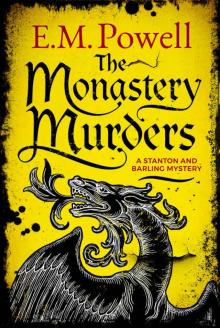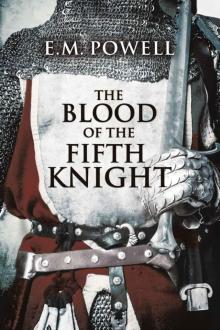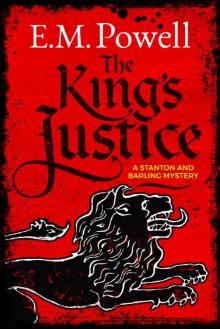- Home
- E. M. Powell
The King’s Justice Page 2
The King’s Justice Read online
Page 2
Over the water. Still screaming. Screaming. Screams melting into those of the crowd in a piercing echo that made Stanton’s head ring.
Then the man was down. Into the pit. Gone.
Now people surged harder than ever, desperate to see this new judgement of the water.
Stanton pushed back, fought for his own breath even as he knew that the man in the water would be fighting for his. The quiver of the rope told of that battle.
But. ‘He’s still down!’ He grabbed at Nesbitt’s sleeve. ‘He must be innocent.’
His cry was echoed by others over and over.
Nesbitt spat in disgust. ‘I know, curse him.’
Still down. No sign. Stanton put his hands to his head, wordless shouts now coming from his throat. Judgement again. But innocence this time.
A few huge bubbles broke the dirty surface. Nothing else. No sign of the man. The rope shuddered as if a heavy fish fought for its freedom.
Then all movement stopped. Nothing. It was utterly still.
‘Bring him up.’ De Glanville’s order cut through the noise.
The guards hauled and hauled, and the motionless form of the man broke the surface, muddy water streaming from his body as it had from the first. But where the first man was still a coughing heap on the ground, the one now pulled from the water made no sound. His body landed on the soaked platform with a squelching thud, mouth wide, as it had been minutes before, yet silent now, eyes fixed and sightless.
Stanton’s stomach dropped. The man was dead. An innocent man was dead.
A chorus of shocked gasps and a buzz of questions joined the clamour of those still shouting and praying.
Up on the platform, de Glanville exchanged a look with his fellow justices, then turned to murmur to both of them. As they did so, another dark-robed figure stepped up to join them.
Stanton recognised Aelred Barling, one of the senior clerks of the court.
‘What could Barling want?’ said Nesbitt.
Stanton shrugged. He didn’t know and didn’t care. The officious, fussy clerk couldn’t give life back to the innocent man who’d just lost it.
After a terse exchange, Barling removed himself with a quick bow of his tonsured head.
All three justices exchanged nods, their faces sombre.
‘Good people.’ De Glanville faced the crowd again and gestured with an open palm to the dead prisoner. ‘This man had three days in which to prepare himself for the ordeal. He heard Mass with the appropriate liturgy. Fasted. For that is how one should face the ordeal. Prepared. Calm. Putting one’s absolute trust in Almighty God. With steadfast faith.’ De Glanville shook his head. ‘Not with disbelief. Nor fear. This man’s lack of faith let him down. But his innocence has been proved. If he is without other sin, God will welcome his soul into heaven. Justice has been done.’
Huge cheers greeted his words.
Stanton didn’t join in. Henry’s justice. It hadn’t changed. The blameless still perished. He clamped his jaw lest he shout his anger as the calls proclaiming Henry’s greatness built once more.
Then in the din came a different shout. ‘I’m guilty! Guilty!’ It came from the third prisoner, much burlier than the other two, his naked muscles glistening in the sun.
The noise of the crowd fell away and the faces of those surrounding Stanton could be his own: eyes wide, mouths open in surprise.
Nesbitt gave Stanton a huge grin. ‘That’s more like it.’
Stanton nudged him. ‘Listen.’
‘Guilty, yes, I’m guilty.’ The man tripped over his words in his haste to speak. ‘Yes, my lord justices. But hear me, hear me, I beg you.’
De Glanville’s face showed no emotion. Same with the other two justices. ‘Go on.’
The man fell to his knees. ‘I’m guilty, but guilty of being with him, nothing more.’ He gestured at the live prisoner. ‘He’s a murderer, he is. Like the water says. The water’s right. You’re right, my lords. Me, the dead man. We were both there. But we committed no crime. We’re both innocent. I’m confessing, confessing, see? I . . . I don’t need to go in. Not in there.’
Despite a few gasps and stifled cries, the quiet held. Nobody wanted to miss a word.
‘You are admitting to being present at the murders?’ asked de Glanville.
‘Yes, my lord. Yes. I was there, at the house. When the woman and the girl . . .’ The man shook his head. ‘But that’s all.’
‘All?’
‘Yes, my lord.’
‘I see.’
Something in de Glanville’s tone made Stanton’s neck prickle.
The justice went on. ‘Only a short while ago, before you were led out from the cathedral, you and your fellow accused were stripped of your clothing as part of your preparation for the ordeal. One of my clerks carried out a thorough examination of those garments. He found this sewed into your cloak.’ De Glanville drew a small object from his own wide sleeve and held it up.
Stanton pulled in a sharp breath. Now he knew why Barling had appeared.
The man looked as if somebody had struck him as the widower gave a cry of anguish.
Confused questions filled the air.
Stanton didn’t join in. He knew what de Glanville held, had heard of its theft in the court: a silver ring brooch.
‘This,’ said de Glanville, ‘is what you stole in the most violent of robberies, which took the life of this man’s wife and daughter.’
Howls of rage broke from those watching as the prisoner, bellowing, tried to lunge at the justice, while the guards grappled with him.
De Glanville stood like stone, raising his voice to echo over it all. ‘You thought your false confession would spare you the water and so you would elude the King’s justice. You have eluded nothing. Nothing. The punishment for your theft is the loss of that hand.’ He pointed to the man’s right hand. ‘And that foot.’ The left.
Stanton’s stomach turned over as the rage became ugly, ugly cheers. He looked over at Nesbitt. ‘Let’s go. Time for more ale.’
Nesbitt shook his head, put his finger to his lips.
De Glanville still addressed the prisoner. ‘The ordeal has established your guilt. You are guilty of robbery. And . . .’ He looked at his fellow justices, who nodded. ‘And guilty of murder. By the judgement of God, of King Henry, you will hang this day.’
The widower sank to the ground praising God, the justices, the King. His cries were taken up in a deafening roar.
‘But first you will pay the price for your theft.’ De Glanville gave a signal and a guard approached the platform, a heavy axe to one shoulder.
Stanton had to get out of there. ‘Think I’ve had enough.’
‘Not got the stomach for bloodshed, have you, young Stanton?’ Nesbitt’s wide grin mocked as much as his tone.
‘My stomach’s all right. I’m ready for more ale, that’s all.’ And I know more about bloodshed than you ever will. He went to push back through the press of people.
‘See you later on, Iron Belly.’ Nesbitt gave him a mocking salute.
A hand tugged at his sleeve. He looked down.
The girl from before with the thick brown hair stared right at him. ‘I have some fresh flowers if sir would like to see them.’ Her lip twitched with her arch look.
Stanton summoned up a wink for Nesbitt. ‘Enjoy yourself, I’m sure you will.’ He forced a smile at the girl. ‘I’m off for my sort of pleasure.’
In return, she slipped an arm through his and led him off through the baying crowd.
Chapter Three
‘Why does your friend call you Iron Belly?’ The girl had to raise her voice as she threaded through the yelling throng with nimble speed, Stanton tight in her grip.
Truth be told, he was glad of her help. His legs felt as if he’d been running far and fast, all the ale he’d drunk mixing with the horror of the ordeal. From behind, piercing through every other noise, came a terrible thud and the shrillest scream.
He swallowed hard to bring spi
ttle back to his dry throat. ‘He’s not my friend. We both serve the justices. As do the many men that have travelled with them. That’s all.’
‘Oh.’ She ducked into a shaded narrow alleyway to the side of a shuttered shop, so narrow the sun must never reach it. ‘I thought all important men like you were friends.’
He coughed at the reek of the urine of cats and men. But the walls and low roofs made a welcome shield against the dreadful happenings nearby. ‘I’m not that important.’ His boots squelched on the damp, mossy muck underfoot.
‘Oh,’ she said again. ‘I think you are.’ She pulled him into a broken-down rotting doorway, the better to shield them from any prying eyes.
Better for him as well – it gave him something to lean his drink-fuddled head against.
‘You serve the King. And a man as fair as you must be important.’ She reached one hand up to rake her fingers through his hair. ‘Such golden hair. Such blue eyes. I thought you must be a young prince or a brave warrior when I saw you.’
Whores’ flattery. He knew it well – yet her boldness made him smile. ‘You could call me Prince Iron Belly. But I’m no warrior, no fighter.’
‘No?’
‘No. And the women I know like to call me Hugo.’
‘You know many women, do you?’ Her other hand dropped to below his belt.
‘More women than warriors.’ He slipped his hand under her coarse skirts, found warm, yielding flesh. ‘Which I prefer.’
‘I’m glad you do.’ She opened the fastening of his braies with practised ease. ‘Hugo.’
‘And what shall I call you?’
She slid expert fingers around him. ‘Daisy.’
He caught his breath at her touch. ‘Daisy?’
‘Like the flower.’
‘Of course.’ He gasped again. Saints be praised, this girl knew what to do. ‘You’re a flower seller.’ He lowered his mouth to hers, and she parted her lips for him. He closed his eyes, tried to lose himself in his body’s reaction to her hands on him, to how she felt under his touch. She wasn’t his love, this wasn’t love. His love, his Rosamund, was dead. But this girl, this plain whore who called herself Daisy, was here, was alive. Her skin was whole, soft against his. And there were no blades, no screams, no bloodshed, no gallows.
She stopped dead. Thrust herself from him.
He opened his eyes. ‘What?’
‘Hugo.’ Daisy pointed a trembling finger down the alley. ‘There. A robber.’
A ragged man lumbered towards them, club in one hand, his muscular bulk the width of the dank alley. ‘Good day to you,’ he said, showing broken teeth below a wide nose.
‘A plague on it.’ Stanton fumbled his breeches shut with one hand, grabbing Daisy’s arm with the other. ‘Down the other end of the alley. Quick.’ They made it less than five steps when another armed man filled the exit.
‘We’re trapped,’ came Daisy’s anguished whisper.
Stanton stepped back to the doorway and pushed Daisy in behind him with a string of quiet oaths.
The first man reached them. ‘Are you two fine folk deaf?’ He gave his gap-toothed grin again. ‘I said good day.’
‘Good day to you.’ Stanton made his reply as firm as he could, tried not to sway on his feet.
‘And to you.’ The second one was here now. He gave an exaggerated bow. ‘Sir.’
‘Yet a solemn day,’ said Stanton. ‘With the ordeal. Where a robber is paying the price for his crime. The very highest price.’
He had a slim hope that calling on the nearby judgement would help. It didn’t.
‘Solemn?’ The man pointed his club at Stanton’s belt. ‘I’d say happy.’ He raised the club level with Stanton’s face. ‘Happy for us that everyone is busy at the pit. While you hand over that full purse of yours.’
Stanton gave the slightest of nods. Any more and his nose would be on the knobbly wood. ‘I willingly give it.’ His hands sought out his purse tie, with a silent Daisy pressed behind him. He prayed she had the sense to stay that way. His purse contained her payment. But this was no time to protest. This was the time to stay in one piece. He placed the bag of coins in the robber’s hand. ‘There. Now I wish you a final good day.’
The man shoved the purse under his patched tunic. ‘We’ll have the girl too.’
A soft gasp from Daisy.
Damn it all. ‘No.’ Stanton squared his jaw and met the robber’s gaze. ‘She’s with me for now.’
‘Don’t, Hugo.’ She tried to push past him. ‘Don’t.’
But he had to. Had to try. He stayed her with a hand. He’d failed the woman he loved; he couldn’t, wouldn’t fail another. ‘You’re welcome to my full purse, my friend. But leave this girl be.’
The robber put his head to one side. And lowered his club.
Stanton swallowed hard. ‘Now, on your way.’ He gave the man a civil nod, his shoulders and legs locked to try to keep steady.
He didn’t even see the man’s fist, caught a blur of movement, and then he was down on the filthy, stinking ground, doubled over with a burst of pain in his stomach and the wind driven from him. Fighting for breath, any breath, he looked up to see the robber hold his hand out to Daisy.
She stepped over Stanton without even a glance down. ‘You took your time,’ she said to the man.
He patted her face with one huge palm. ‘Never far away, don’t you worry. And we could tell you’d have no trouble with this fool.’
Stanton rolled to one side, hands clawing at the sticky mud, coughing, chest heaving, his breath returned but every one a sharp stab, as were the man’s words. A fool. He managed to rise on one elbow.
The robber smirked down at him and jerked his head at his companion and the girl. ‘Come on. Before someone sees. I want to keep all my limbs.’
‘Wait.’ She dropped to her haunches and grasped Stanton’s chin in her hand.
He tried to push her off, but he still had no strength.
‘Prince Iron Belly, you’re so sweet, trying to defend me. Sweet.’ She gave him a little shake. ‘But stupid. Either of this pair could snap you in two. You’re right when you say you’re not a warrior.’ She kissed him hard on the mouth. ‘So keep that pretty face for the girls.’ She stood up. ‘That’s my advice.’
‘As for paying the price,’ said the leader of the robbers. ‘A man’s only guilty if he’s caught.’ He drew his boot back. ‘We’re not getting caught.’
Stanton ducked away. Not fast enough. And the boot hit the same spot as the fist. Then his face.
He would never get up again.
Chapter Four
Aelred Barling, clerk to the King’s justices, checked the number of cases left to hear on this, the last day that the court would sit in York.
The hours of the evening and the night to come would see the many, many preparations needed for moving such a large assembly. Tomorrow the court would start its progress on to the next county. As ever, the numbers involved would mean it would not be swift. These visitations, these eyres, as demanded by the lord King, were an enormous undertaking. The court in which Barling now sat, headed by the justices de Glanville, de Vaux and Pikenot, covered the northern counties from Lancashire to Northumberland and beyond. The long hours of the fierce June sun would slow the pace even more. Barling did not look forward to the inevitable heat and discomfort.
But for now, around him in the keep of the castle, all was proceeding in the correct manner and order, despite the early hour. The court would finish its business here today as planned.
The justices sat above Barling on their raised dais immediately to the left of his desk, the pipe rolls and writs they would need arranged before them on the wide table. Many of the clerks had their heads down as they made careful notes on wax tablets. Others moved back and forth with quiet efficiency in their necessary, orderly tasks, with any discussions taking place in a low murmur. Those people appealing the next cases waited in awed silence, many clutching documents of their own. As their appeals were h
eard, they would be replaced by others.
The first case was under way, a straightforward land dispute where a tenant claimed he had been improperly ejected from his land. A jury of twelve lawful and free men were with the tenant to support his claim.
‘The plaintiff has been unjustly dispossessed,’ said de Glanville, commencing his judgement.
The familiar rhythm of the wording in the quiet of the court brought Barling a satisfying calm. He allowed himself a small nod as he wiped his hands on a piece of linen before picking up his stylus. A perspiring hand made for an unsatisfactory grip. He began his letters, one ear still open for anything that the justices might require.
While the demands of this court were very considerable and often without cease, Barling took on the burden of duty willingly, as he always did in his service of the King. Duty, however, did not always equate with enjoyment.
Here in the stifling summer heat of York, he found it difficult to recall the piercing cold of London in January, when he had first heard the news from Northampton as he sat in the peace of the King’s writing office.
Yet he had no difficulty remembering his disturbance. He had not shared the excitement of the news that had spread through his fellow clerks of the scriptorium. King Henry had been meeting with his barons. The method for bringing royal government and order to the people would be greatly improved. While the King had had justices travel his realm for some ten years, henceforth there would be six travelling courts, each headed by three justices on circuit. They would make judgements on the possession and inheritance of land. Equally importantly, they would hear cases of serious felony, such as murder, robbery, theft and arson. Punishment would be ruthless and effective. The justices would make sure of it in the name of their lord King.
Barling had listened without comment as the clerks discussed at length the anticipation of many more opportunities to travel with the court, perhaps even the chance to serve as one of the King’s itinerant justices. The idea had filled Barling with utter displeasure. He had no wish to venture from his desk and his books, which were his safety and his sanctuary. But his Grace had decreed that those responsible for his law should travel. And as his lord King demanded, so Barling would serve.

 The Monastery Murders
The Monastery Murders The Blood of the Fifth Knight
The Blood of the Fifth Knight The Lord of Ireland (The Fifth Knight Series Book 3)
The Lord of Ireland (The Fifth Knight Series Book 3) The King’s Justice
The King’s Justice